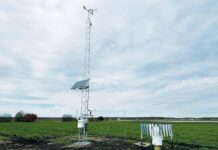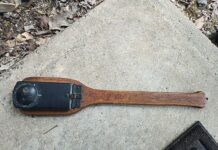(Editor’s note: Instead of grain marketing insight, Marlin Clark shares a different story this week — a story that is more important than the price of corn, and we’re privileged to share it with readers.)
In one of the miraculous coincidences of World War II, two brothers from the farming community of New Springfield, Ohio, met for lunch on Saipan late in 1944.
Tom Carter, a Marine, heard that older brother Walt’s ship had docked, and he got permission to take a buddy and meet him.
By this time in the war, Tom had survived two beach landings and front line service carrying a Browning Automatic Rifle (BAR) in such places as Saipan and Tinian. Now, he was resting and retraining back on Saipan, and wondering what the future held for him.
On board ship he was fed steak and ice cream, a meal he remembered 65 years later because of the change from K-rations. He told his brother some of what he had been through, and then they parted. Someone took a picture, which still exists.
Ahead of them was an endless war and the anticipated invasion of the Japanese homeland. They had to wonder if they would ever meet again. It was another miracle that they did.
Survivors
In the battle for Okinawa, the Navy took the worst casualties. Nearly 10,000 sailors were killed or wounded, mostly by kamikazes. Walt survived the kamikaze that hit his ship. Tom survived the 82 days of horror that was Ie Shima, then Okinawa.
Like many real veterans, he did not talk about his experiences when he came home. Thirty years later, his son-in-law — me — was asking him about weapons, and the dam began to break.
First, the stories were told as humor. (“He didn’t hold onto the grenade long enough, and it came right back out of the cave and landed between us.”) Gradually they became more serious. (“Guys your size didn’t last long with a BAR. When the Japs heard the sound, they concentrated fire on the BAR man. You shot off a few rounds and rolled into a new position.)
War is hell
Then, they became gut-wrenching. (“I told the captain I could not go on patrol with him because the armorer was fixing my BAR. There was a dead Marine lying there under a poncho, with his Garand stuck in the ground by the bayonet. The captain said, ‘Take his rifle. He won’t be needing it anymore.'”)
Tom was in the front lines on a hill when Gen. Simon Buckner walked by to check positions. (“Ten minutes later they carried him back dead on a stretcher, his aide walking beside him, blubbering like a baby.”)
It was on Okinawa that Tom and a foxhole buddy got permission to carry the third member of their foxhole back to an aid station. (“He was gut-shot and there wasn’t much hope, but he was in our hole so we owed it to him”) They lowered him down a cliff on ropes and carried him four miles. Returning on an armored personnel carrier, they were ambushed and leaped off in time to play dead in the ditch for two hours.
Asked if he could still remember the wounded man’s name, Tom got quiet.
“I never knew his name,” he finally answered. “After everyone you know is dead, they are just replacements.”
Surrounded
It was late in the battle when Tom’s platoon got surrounded one day.
“Half the men died in a couple of minutes. The rest of us were in a depression and they could not bring direct fire on us. We knew they would wipe us out with knee mortars, so I was sent as a runner to get help.”
Throwing down his pack, he jumped over the body of the first runner and took off like the winning anchor of the Penn Relays mile race that he was. He got back to an army group and got a couple of tanks to come up and give the men cover to escape.
Is that the kind of thing you get a medal for, I asked?
“I was a Marine!” he answered. “I was just doing my job.”
Then he smiled. “The army guy in charge of the tanks got a medal!”
Malaria robbed future
It was a week before they recovered the ground and retrieved his pack, containing his Atrabrine. By then, the malaria had hit. He passed out on guard duty and woke up on a hospital ship packed in ice to contain his fever.
By the time he got back into action, the war was over. He reported to duty in time to be sent to Japan, where his unit marched though the ruins of Nagasaki two weeks after the bomb was dropped.
In Japan, his captain, who was later a Cleveland Brown, organized a track meet and put Tom in the 440.
“I found out that the malaria had taken too much out of me. I didn’t think I could finish.”
Only a couple of years ago, he admitted to me that he had secretly harbored the hope that, if he could survive, he would go back to Ohio State and claim the track scholarship that he had given up to enlist. At that Japanese track meet, he realized that the war had taken that away from him.
Tom Carter died Sunday morning, March 6, 2011, after the lingering results of a fall. His brother died a few months ago.
Maybe tonight when you are staring at the ceiling before you go to sleep, you will thank God that you live in a free country. These men are the reasons you do.










